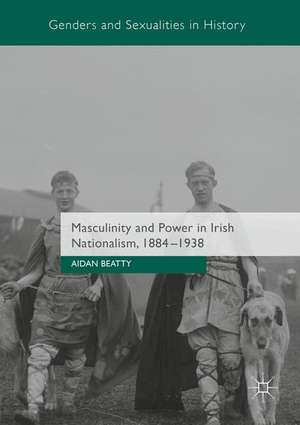Masculinity and Power in Irish Nationalism, 1884-1938: Genders and Sexualities in History
Autor Aidan Beattyen Limba Engleză Paperback – 8 dec 2018
Din seria Genders and Sexualities in History
-
 Preț: 282.38 lei
Preț: 282.38 lei - 9%
 Preț: 695.10 lei
Preț: 695.10 lei - 18%
 Preț: 629.18 lei
Preț: 629.18 lei - 18%
 Preț: 782.57 lei
Preț: 782.57 lei - 20%
 Preț: 693.39 lei
Preț: 693.39 lei -
 Preț: 390.63 lei
Preț: 390.63 lei -
 Preț: 389.70 lei
Preț: 389.70 lei -
 Preț: 394.51 lei
Preț: 394.51 lei - 15%
 Preț: 589.33 lei
Preț: 589.33 lei - 15%
 Preț: 641.71 lei
Preț: 641.71 lei -
 Preț: 389.11 lei
Preț: 389.11 lei - 15%
 Preț: 646.62 lei
Preț: 646.62 lei - 15%
 Preț: 645.47 lei
Preț: 645.47 lei -
 Preț: 389.70 lei
Preț: 389.70 lei -
 Preț: 385.84 lei
Preț: 385.84 lei - 18%
 Preț: 791.09 lei
Preț: 791.09 lei - 15%
 Preț: 701.90 lei
Preț: 701.90 lei -
 Preț: 391.61 lei
Preț: 391.61 lei - 15%
 Preț: 697.32 lei
Preț: 697.32 lei - 15%
 Preț: 643.34 lei
Preț: 643.34 lei -
 Preț: 388.72 lei
Preț: 388.72 lei -
 Preț: 238.73 lei
Preț: 238.73 lei -
 Preț: 390.63 lei
Preț: 390.63 lei - 15%
 Preț: 644.95 lei
Preț: 644.95 lei - 15%
 Preț: 698.15 lei
Preț: 698.15 lei -
 Preț: 391.61 lei
Preț: 391.61 lei -
 Preț: 418.07 lei
Preț: 418.07 lei - 15%
 Preț: 585.26 lei
Preț: 585.26 lei -
 Preț: 395.47 lei
Preț: 395.47 lei -
 Preț: 387.38 lei
Preț: 387.38 lei - 15%
 Preț: 646.62 lei
Preț: 646.62 lei - 18%
 Preț: 826.41 lei
Preț: 826.41 lei - 15%
 Preț: 697.15 lei
Preț: 697.15 lei -
 Preț: 416.16 lei
Preț: 416.16 lei - 15%
 Preț: 643.34 lei
Preț: 643.34 lei -
 Preț: 390.63 lei
Preț: 390.63 lei - 18%
 Preț: 835.73 lei
Preț: 835.73 lei
Preț: 213.58 lei
Nou
Puncte Express: 320
Preț estimativ în valută:
40.87€ • 43.70$ • 34.08£
40.87€ • 43.70$ • 34.08£
Carte tipărită la comandă
Livrare economică 17 aprilie-01 mai
Preluare comenzi: 021 569.72.76
Specificații
ISBN-13: 9781349684168
ISBN-10: 1349684163
Pagini: 266
Ilustrații: XV, 266 p. 10 illus., 3 illus. in color.
Dimensiuni: 148 x 210 x 15 mm
Greutate: 0.34 kg
Ediția:1st ed. 2016
Editura: Palgrave Macmillan UK
Colecția Palgrave Macmillan
Seria Genders and Sexualities in History
Locul publicării:London, United Kingdom
ISBN-10: 1349684163
Pagini: 266
Ilustrații: XV, 266 p. 10 illus., 3 illus. in color.
Dimensiuni: 148 x 210 x 15 mm
Greutate: 0.34 kg
Ediția:1st ed. 2016
Editura: Palgrave Macmillan UK
Colecția Palgrave Macmillan
Seria Genders and Sexualities in History
Locul publicării:London, United Kingdom
Cuprins
Acknowledgements-. Glossary of Irish Terms-. List of Images-. Introduction-. 1. Time, Gender, and the Politics of National Liberation, 1916-1923-. 2. Organised Manhood-. 3. The Genders of Nationalist Space-. 4. National Sovereignty, Male Power, and the Irish Language-. 5. Fianna Fáil, Masculinity, and the Economics of National Salvation-. 6. Regulating Sex, Gender, and Leisure in the Irish Free State-. Conclusions-. Bibliography.
Recenzii
“Aidan Beatty’s insightful and compelling monograph … makes bold strides in addressing the acknowledged lack of investigations into gender and, more specifically, masculinities in modern Irish history. … This is a history that will be of great interest to scholars of gender and sexuality, but it is also a good story well told for those with broader interests in Ireland’s past, particularly during those ever-important decades that defined Ireland’s manly sense of self for the rest of the twentieth century.” (Jane McGaughey, The Canadian Journal of Irish Studies, Vol. 42, 2019)
“This volume will find appreciative readers not only within Irish and Zionist studies, but in fields more broadly concerned with questions of nationalism and gender. For those concerned with the practical value of work on history, this book's publication is all the more important when one considers not only the centenary of the Irish revolutionary period, butmore significantly, the rise of sexist nationalism around the globe.” (Charles Clements, breac.nd.edu, October, 2017)
Notă biografică
Aidan Beatty is Postdoctoral Research Fellow at the Azrieli Institute of Israel Studies and Scholar-in-Residence at the School of Canadian Irish Studies at Concordia University in Montreal, Canada.
Textul de pe ultima copertă
This book is a comparative study of masculinity and white racial identity in Irish nationalism and Zionism. It analyses how both national movements sought to refute widespread anti-Irish or anti-Jewish stereotypes and create more prideful (and highly gendered) images of their respective nations. Drawing on English-, Irish-, and Hebrew-language archival sources, Aidan Beatty traces how male Irish nationalists sought to remake themselves as a proudly Gaelic-speaking race, rooted both in their national past as well as in the spaces and agricultural soil of Ireland. On the one hand, this was an attempt to refute contemporary British colonial notions that they were somehow a racially inferior or uncomfortably hybridised people. But this is also presented in the light of the general history of European nationalism; nationalist movements across Europe often crafted romanticised images of the nation’s past and Irish nationalism was thus simultaneously European andpostcolonial. It is this that makes Irish nationalism similar to Zionism, a movement that sought to create a more idealized image of the Jewish past that would disprove contemporary anti-Semitic stereotypes.
Caracteristici
Awarded the James S. Donnelly Prize for Best Book in History and Social Science at the American Conference for Irish Studies 2017 Draws on multi-language archival sources to show the efforts of Irish nationalists to remake themselves Shows how these efforts attempted to counter colonial notions of English superiority and Irish inferiority
